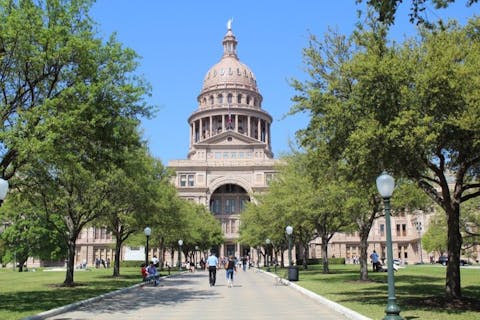In this article, we will be taking a look at the 15 states most dependent on the Federal government. To skip our detailed analysis, you can go directly to see the 5 States Most Dependent on the Federal Government.
The U.S. is a federal republic, which means that there is a division of power between the Federal government and the 50 states that comprise the United States of America. This means that detailed legislation can vary significantly from state to state, while some overarching laws from the Federal government are applicable to all states, and in case where there’s a conflict between the two, the Federal government supersedes state government.
Every year, each state’s lawmakers jostle for tens of billions of dollars from the Federal government after the federal budget is agreed. While it might seem counterintuitive, the money that states get vary significantly, not just in terms of total assistance but in terms of federal aid per capita. We wrote previously to discuss how this can negatively impact a state’s willingness to contribute to the federal government, especially in the case of the Covid-19 pandemic, when New York, one of the biggest contributors to the Federal government, was the hardest hit initially and yet its request for aid was rebuffed. The analogy of insurance not paying out despite paying an insurance premium for that very reason still holds true today, and may even be more relevant now. Right now, states including Utah and Connecticut are among the states that pay the most taxes and get the least back, even though all 50 states have a positive balance of payments, which means that they are all taker states, though historically, New York has been a donor state.
Smart Asset conducted a research on the states most dependent on the Federal government, and found that the most dependent states were mostly of a Republican majority, with Red states making up 8 out of top 10 dependent states. Many of these states have been traditionally red for several elections, with one of the reasons why Red states get more in Federal funding being the fact that the income per capita is often lower as compared to Blue states, and hence the reliance on Federal funds is much higher. Meanwhile, overall on average, 39% of state revenues come from the Federal government though of course, like we’ve said earlier, federal dependency by state varies heavily.

One of the states which receives the highest level of funding from the Federal government is West Virginia, where 45% of its total state revenue is federally funded. According to a 2021 report by the Rockefeller Institute of Government, in 2019, West Virginia received $2.15 from the Federal government for every $1 paid back in taxes, and the situation has been like this for several years now. Further, because West Virginia is home to some of the biggest aerospace and defense companies in the world, these companies operate primarily on lucrative contracts with the Federal government worth tens of billions of dollars. After all, the military announced a budget of $843 billion and has a budget biggest than the next top 10 combined! Separately, federal aid does include contracts awarded by the different agencies including the Department of Defense and Department of Homeland Security, and according to USAspending.gov, Northrop Grumman Corporation (NYSE:NOC) was one of the biggest recipients of such contracts.
Another interesting fact that arises from research of states most dependent on the Federal government is the fact that states with most Federal employees, while obviously more dependent on the Federal government, are also more recession-proof. This is because when the economy takes a downturn, as it did to a much lesser extent than expected towards the end of 2022 and start of 2023, the Federal government still doesn’t layoff its employees whereas when we take a look at states with larger private workforces, layoffs tend to be much more frequent as seen when tech companies started laying off tens of thousands of employees in the last year when their share price was nosediving. This was evidenced in a study in 2014 conducted by Harvey S. Rosen of Princeton University, where a sample of 800,000 employees concluded “We find that workers in all levels of government are substantially less likely to be displaced than their counterparts in the private sector even after differences in worker characteristics are taken into account. During non-recession years, employees of the federal government are 4.2 percentage points less likely to lose their jobs than private sector workers; the comparable figures for employees of local and state governments (other than teachers) are 4.2 percentage points and 3.3 percentage points, respectively. These differences are larger during recessions; that is, the advantage to being in the public sector widens during recessions.”
Of course, it’s not just states that benefit hugely from Federal funding, various companies enjoy massive funding and contracts from the Federal government as long as they’re providing a service integral to the wellbeing of the country, be it utilities, construction and of course, defense. According to 24/7 Wall St. Lockheed Martin Corporation (NYSE:LMT), The Boeing Company (NYSE:BA), General Dynamics Corporation (NYSE:GD) and Raytheon Technologies Corporation (NYSE:RTX) are the biggest recipients, with all of them unsurprisingly also being major defense contractors.
Methodology
States with the biggest populations are always going to get the highest level of Federal aid, which makes it an inaccurate metric to obtain rankings of states with that are the most dependent on the Federal government. This is why, to compute our rankings, we have considered states with the highest ratio between receiving aid from the Federal government and making payment to it, to form our overall ranking of states most dependent on the federal government, with all of our data being compiled from the Rockefeller Institute of Government. It is interesting to see that all states had a positive balance of payment to the federal government in 2021 i.e. it received more money from the federal government , particularly because of historic government budget deficit as a response to the Covid-19 pandemic, which means this will only be temporary for some states such as New York, which has historically had a negative balance of payments.
15. Vermont
Aid per dollar of payment to the Federal government: $2.11
Even though Vermont ranks 11th in terms of states with the highest payment per capita to the government, it also receives one of the highest funding per capita from the Federal government, which is why the state just made our list.
14. Arizona
Aid per dollar of payment to the Federal government: $2.12
The largest source of funding for Arizona, as is the case for most states, is the Federal government. One of the reasons why Arizona pays less in taxes is because of major tax cuts for the rich, which is why middle-income families pay twice per $100 of income as compared to the highest-income families.
13. Maine
Aid per dollar of payment to the Federal government: $2.20
Maine is one of the worst contributors in terms of payments per capita to the Federal government, ranking in the bottom 15 states. The primary reason behind this is that Maine’s household income is second from the bottom in the United States. After all, according to a study by the Harvard University, around 40% of residents in Maine are struggling to even pay rent as housing costs dominate the state’s struggling economy.
12. South Carolina
Aid per dollar of payment to the Federal government: $2.25
South Carolina received over $100 billion in Federal aid in 2021, while only returning $44.5 billion in Federal taxes.
11. Hawaii
Aid per dollar of payment to the Federal government: $2.31
Despite Hawaii being one of the states with the lowest balance of payments to the Federal government, its balance of payments per capita is significantly high, and the state received $1.6 billion in direct state fiscal aid, in addition to nearly $500 million additionally from the Federal government under the American Rescue Plan.
10. Arkansas
Aid per dollar of payment to the Federal government: $2.37
Arkansas’ Federal individual income tax rates per capita were $2,500 less than the U.S. average, while Federal payroll taxes were nearly $1,000 below the U.S. average. Since these are the two biggest contributors to the Federal government from the state government, Arkansas easily ranks among the states most dependent on the Federal government.
9. Oklahoma
Aid per dollar of payment to the Federal government: $2.42
While Oklahoma ranks firmly in the middle in terms of Federal aid, its also one of the lowest contributors in taxes to the Federal government, thus making it one of the states most dependent on the Federal government.
8. Virginia
Aid per dollar of payment to the Federal government: $2.62
Easily making the list of the states most dependent on the federal government is Virginia. The reason Virginia’s spending is so high is because of its close proximity to Federal headquarters, and hence, gets much higher funding for Federal wages as well as for procurement purposes.
7. Louisiana
Aid per dollar of payment to the Federal government: $2.70
Even though Louisiana receives less than $100 billion from the Federal government, its low contributions in terms of taxes place it in our list.
6. Alaska
Aid per dollar of payment to the Federal government: $2.74
Alaska is one of the states most dependent on the Federal government mainly because of higher than average Federal spending in the state.
Click to continue reading and see the 5 States Most Dependent on the Federal Government.
Suggested articles:
- 20 Best Makeup Products to Buy
- Lone Pine Capital: Portfolio, Team, AUM
- 10 Best Revenue Growth Stocks to Buy
Disclosure: None. 15 states most dependent on the Federal government is originally published at Insider Monkey.





